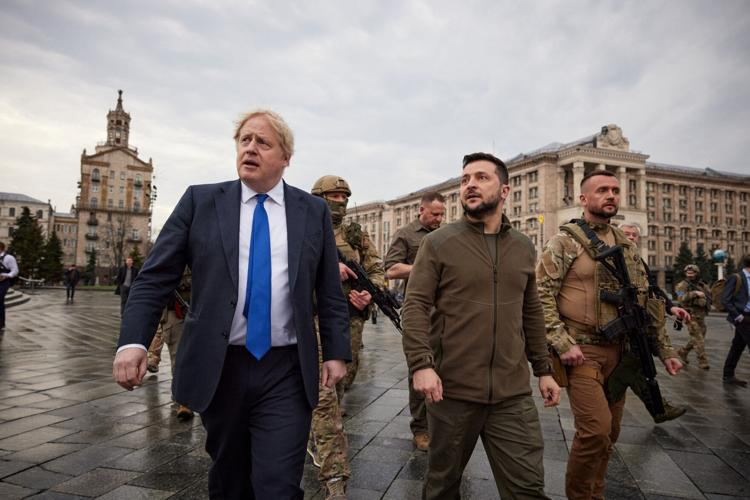KYIV, (Reuters) – Ukraine is ready for a tough battle with Russian forces amassing in the east of the country, President Volodymyr Zelenskiy said yesterday, and British Prime Minister Boris Johnson offered fresh financial and military support during a surprise visit.
At a meeting in Kyiv, Johnson told Zelenskiy that Britain would provide armoured vehicles and anti-ship missile systems, along with additional support for World Bank loans.
Britain also will continue to ratchet up its sanctions on Russia and move away from using Russian hydrocarbons, he said.
The support aims to ensure that “Ukraine can never be bullied again, never will be blackmailed again, never will be threatened in the same way again,” Johnson said.
Johnson was the latest foreign leader to visit Kyiv after Russian forces pulled back from areas around the capital just over a week ago.
Earlier in the day, the Ukrainian leader met Austrian Chancellor Karl Nehammer in Kyiv, warning in a joint news conference that while the threat to the capital had receded, it was rising in the east.
“This will be a hard battle, we believe in this fight and our victory. We are ready to simultaneously fight and look for diplomatic ways to put an end to this war,” Zelenskiy said.
Ukranian negotiator Mykhailo Podolyak said Zelenskiy and Russian President Vladimir Putin would not meet until after the country defeated Russia in the east, which would bolster its negotiating position.
“We are paying a very high price. But Russia must get rid of its imperial illusions,” he said, according to the Interfax Ukraine news agency.
Air-raid sirens sounded in cities across eastern Ukraine, which has become the focus of Russian military action after the withdrawal from around Kyiv.
Ukrainian officials have urged civilians in the east to flee. On Friday, officials said more than 50 people were killed in a missile strike on a train station in city of Kramatorsk in the Donetsk region, where thousands of people had gathered to evacuate.
Russia’s invasion, which began on Feb. 24, has forced around a quarter of the population of 44 million to leave their homes, turned cities into rubble and killed or injured thousands.
The civilian casualties have triggered a wave of international condemnation, in particular over deaths in the town of Bucha, a town to the northwest of Kyiv that until last week was occupied by Russian forces.
“We will never forget everything we saw here, this will stay with us for our whole lives,” said Bohdan Zubchuk, a community policeman in the town, describing his life before and after the war.
British military intelligence said that Russia’s retreat from the region revealed “disproportionate” targeting of civilians.
Russia has denied targeting civilians in what it calls a “special operation” to demilitarize and “denazify” its southern neighbor. Ukraine and Western nations have dismissed this as a baseless pretext for war.
Friday’s missile attack at the station in Kramatorsk, a hub for civilians fleeing the east, left shreds of blood-stained clothes, toys and damaged luggage strewn across the station’s platform.
City Mayor Oleksander Honcharenko, who estimated 4,000 people were gathered there at the time, said on Saturday that the death toll had risen to least 52.
He said he expected just 50,000 to 60,000 of Kramatorsk’s population of 220,000 to remain as people flee the violence.
Ukraine said 4,532 people were evacuated from its cities yesterday, down from 6,665 the day before.
Russia has denied responsibility, saying the missiles used in the attack were only used by Ukraine’s military. The United States says it believes Russian forces were responsible.
Reuters was unable to verify the details of attack.
The Ukrainian military says Moscow is preparing for a thrust to try to gain full control of the Donbas regions of Donetsk and Luhansk that have been partly held by Moscow-backed separatists since 2014.
The British Defence Ministry said air attacks are likely to increase in the south and east as Russia seeks to connect Crimea – which Moscow annexed in 2014 – and the Donbas, but Ukrainian forces are thwarting the advance.
Russia’s military said yesterday it had destroyed an ammunition depot at the Myrhorod Air Base in central-eastern Ukraine.
Johnson and Nehammer visited Ukraine a day after European Commission President Ursula von der Leyen.
Video posted on Twitter showed Johnson and Zelenskiy, flanked by soldiers, walking through central Kiev to a memorial marking the 2014 Maidan Revolution.
The EU on Friday adopted new sanctions against Russia, including bans on the import of coal, wood, chemicals and other products. Oil and gas imports from Russia so far remain untouched.
Zelenskiy urged the West to adopt a complete embargo on Russian energy products and supply more weapons to Ukraine.
“Russia can still afford to live in illusions and bring new military forces and new equipment to our land. And that means we need even more sanctions and even more weapons for our state,” he said in a late-night address.
The visits by foreign leaders were a sign that Kyiv was returning to some degree of normality after the Russian retreat. Some residents have begun to return to the capital, with cafes and restaurants reopening, and Italy said it plans to re-open its embassy in the city later this month.






